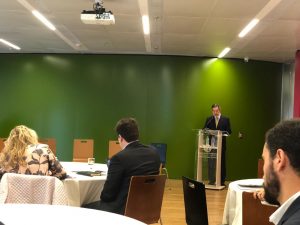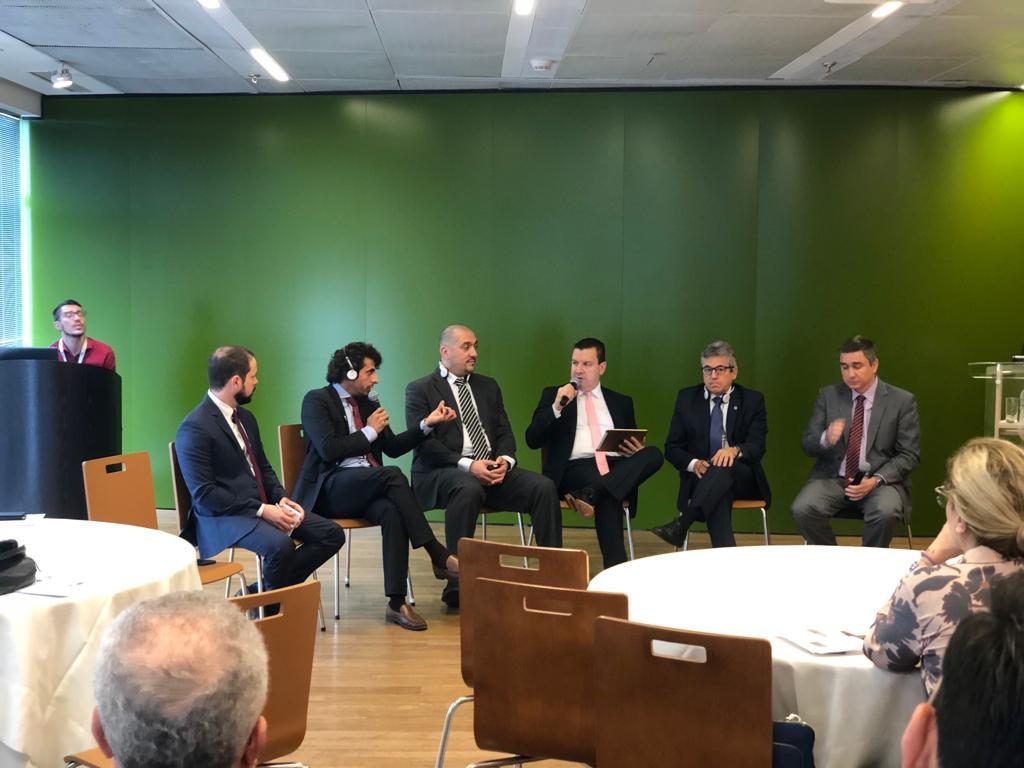São Paulo – Saudi Arabia is looking to become a pharma industry hub for the Middle East and North Africa. So said Raed Al-Swayed, vice president of Saudi Pharma Industrial Clusters, a Ministry of Industry arm, during a presentation at the Brazil-Saudi Arabia Pharma Seminar this Tuesday (8) at the Arab Brazilian Chamber of Commerce, in São Paulo.
In his lecture, Al-Swayed discussed the advantages and incentives available to pharma companies looking to operate in Saudi Arabia. “Brazilian companies can come to our country alone or in joint ventures (with local or foreign companies),” he said. The Saudi pharma market turnover is currently USD 8.2 billion, with pills and oral solids accounting for USD 3.5 billion, and biological and biosimilar drugs growing the fastest and currently amounting to USD 1.6 billion (2018 data).
Al-Swayed believes Brazil has great potential in vaccines and generic drugs. “We’re optimistic that Brazilian companies will come to our country in the next few years. We’re a market whose population is increasing and aging,” he said. Saudi Arabia has a population of 32.6 million, which he said should reach 40 million by 2030.
The executive said he’s due to visit Instituto Butantan and Fundação Oswaldo Cruz (Fiocruz) in the next few days. He also said Brazil’s president Jair Bolsonaro will be a guest of honor at the Future Investment Initiative (FII) conference, aka Davos in the Desert, taking place in Riyadh from October 29 to 31.
The executive said he’s due to visit Instituto Butantan and Fundação in the next few days. He also said Brazil’s president Jair Bolsonaro will be a guest of honor at the Future Investment Initiative (FII) conference, aka Davos in the Desert, taking place in Riyadh from October 29 to 31.

Arab Chamber International Relations vice president Osmar Chohfi delivered the keynote speech. “More than being a final destination for Brazilian goods, Saudi Arabia shows great promise in becoming an export hub for pharmaceuticals, acting as a gateway to other markets across the Middle East and North Africa,” said Chohfi.
Bandar Alhammad, the director of the Benefit-Risk Assessment Department (BRAD) at the Saudi Food and Drug Authority (SFDA), was also a speaker at the Seminar. He said that if a medication is approved by Brazil’s National Health Surveillance Agency (Anvisa), it’s also likely to comply with Gulf countries’ regulations. “It’s almost the same thing, but for GCC countries there’s an additional requirement: products must be certified pork free and alcohol free,” Alhammad explained. Items must be halal, i.e. not containing ingredients whose consumption is prohibited to Muslims.
The director also said registration applications are fully online and paperwork-free. He went on to explain that the SFDA is aligned with the Vision 2030 plan to diversify the Saudi economy, and that it’s looking to enter into partnerships with domestic and international public and private sector players and organizations.
Speakers from Brazil included Anvisa Biological Affairs director Bernardo Moreira; Pharmaceutical Industry Union (Sindusfarma) Technical Affairs director Jair Calixto; and Brazilian Pharmaceutical Inputs Association (Abiquifi) CEO Norberto Prestes. Saudi Pharma Industrial Clusters’ Investment Strategy and Promotion director Adalberto Netto was the moderator. Pictured above, from left to right, are Prestes, Alhammad, Al-Swayed, Netto, Calixto and Moreira.
Prestes said Abiquifi is working with Saudi Arabia as an ally for the next two years, showing Brazilian pharma companies the business opportunities in the Saudi market; doing workshops on how to enter the market and deal with regulatory issues; holding business missions; and bringing Saudi authorities to Brazil. “There are great opportunities both in exports and for companies to come to Saudi Arabia. We predict that this should happen more and more in the next three years,” he said.
The event was organized by SFDA and Saudi Pharma Industrial Clusters, in partnership with Anvisa, Abiquifi and Sindusfarma, with support from the Arab Brazilian Chamber of Commerce. Some 40 delegates from Brazilian companies attended, including Laboratório Nacional de Biociências (LNBio) and pharma companies Allergan, Blanver, Biolab Farmacêutica, and Nortec Química.
Translated by Gabriel Pomerancblum




